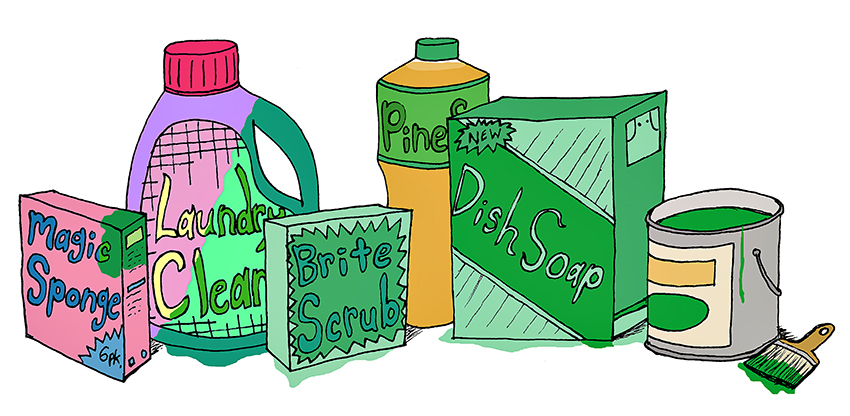Consumers must make countless decisions every day regarding apparel, food and other items. Companies bombard us with advertisements to persuade us into selecting them over others, and all too often, consumers irresponsibly choose products that damage our environment.
Last Thursday, EnviroMedia and the Stan Richards School of Advertising and Public Relations hosted a panel discussing greenwashing, an advertising strategy that promotes environmentally friendly aspects of a product or company, even if the claims are greatly exaggerated or false. While it’s easy to point the finger at these businesses for this deceptive practice, we should acknowledge that it’s ultimately up to each individual consumer to make informed and responsible product choices.
The Federal Trade Commission currently publishes “Green Guides” to advise marketers on what they should and should not say about the green qualities of their products. These guidelines exist to protect consumers from deceptive marketing messages, but since they are not legally binding, marketers can simply ignore or sidestep them.
For example, the panel said companies such as ExxonMobil and Ozarka have notoriously touted their green efforts and features despite offering products with negative environmental impacts. ExxonMobil said today’s cars give off 95 percent fewer emissions than cars in 1970, but even if this were true (which it expectedly isn’t), the claim audaciously assumes it can eliminate every negative impact of petroleum-based transportation just by reducing emissions. Similarly, Ozarka emphasizes how their bottles use less plastic than others but ignores the fact that plastic water bottles inherently harm the environment.
Lucy Atkinson, assistant advertising professor and member of last week’s panel, conducted a study in 2014 to examine how consumers respond to greenwashed advertisements. She said environmentally-conscious consumers evaluate the sustainability of products before purchase, but due to greenwashing, these evaluations can become misguided.
“In an ideal world, consumers would evaluate all marketing claims with care and make smart, informed decisions,” Atkinson said. “But as consumers, we rarely make such involved, calculated decisions. Instead, we rely on heuristics or shorthands, like eco-labels or green claims, to decide if a product is sustainable and worth our money.”
It’s far from surprising that companies would mislead consumers in the pursuit of profit. The huge negative impacts of certain products are common knowledge, and the only way to diminish these impacts is to stop continuing their commercial success. Instead of putting blind trust into advertising claims, consumers must remain skeptical and do their research before making any purchase.
Environmental science freshman Justin Pulliam said no matter how much we blame corporations for environmental impacts, it means nothing if consumers continue to purchase their products or services.
"We can’t blame big polluting, unsustainable corporations 100 percent if we keep buying their products,” Pulliam said. “It’s our job to change the world’s economy and system, and if [companies] are destroying the planet, [we should] stop giving them money.”
With all of the consumer options available to us, it’s important we make smart purchases from companies with minimal environmental impacts. Advertisers will continue to mislead us, but instead of following them, we should defy them by spending our money on truly green alternatives.
Chan is a journalism freshman from Sugar Land. He is a senior columnist. Follow him on Twitter @BenroyChan.





















